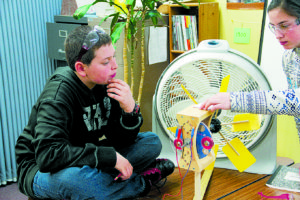
Students at Cabot School in Vermont tackle a wind engineering challenge in a VEEP Renewables by Design in-class workshop, March 2016. Photo courtesy of VEEP/Aaron Heyerdahl.
The Vermont Energy Education Program (VEEP) will bring its hands-on programming across the Connecticut River to New Hampshire teachers and schools in the coming school year.
VEEP recently received a grant from the Putnam Foundation to make that opportunity a reality. This first year of funding will begin a relationship with its neighboring state that VEEP hopes will be ongoing. VEEP is actively seeking additional funding to increase this year’s offerings and continue to serve New Hampshire schools in future years.
“New Hampshire doesn’t have an organization doing energy education programming in schools,” says Cara Robechek, VEEP’s executive director. “We saw this as an opportunity to help teachers bring this education into their classes.
“We hope to be able to expand our services in New Hampshire during the coming year,” says Robechek, “and we’d love if our energy advocates in New Hampshire would let teachers know about our programming.”
VEEP offers a free day of in-class workshops for K–12 schools in western New Hampshire, with additional free days available for large schools or schools that serve low-income populations. VEEP’s hands-on, interactive workshops on subjects like climate change, renewable energy, efficiency, and weatherization encourage students to think like scientists, solving hands-on engineering problems and reflecting on their observations and experience.
VEEP also plans to offer education and professional development for New Hampshire teachers, including support for all-school projects that reduce energy use and the opportunity to borrow kits of educational equipment to use in the classroom. VEEP can also lead in-depth, custom trainings to help teachers develop hands-on science units and align their lessons with the Next Generation Science Standards.
The staff members at VEEP believe that education is the path to societal changes around energy. VEEP programming uses exemplary teaching and learning methods about energy, which empower students with knowledge and paths to action to reduce energy use. This deeper understanding changes the way young people think about energy, helping them to become decision-making adults who can change our society’s energy habits and build resilience to weather the changes brought on by climate change.
For more information on VEEP’s in-class workshops, curricula, professional development for teachers, and other hands-on energy education programs, visit veep.org. You can also contact Cara Robechek at 802-552-VNRG or e-mail cara@veep.org to schedule a local VEEP educator for your school.








Leave a Reply